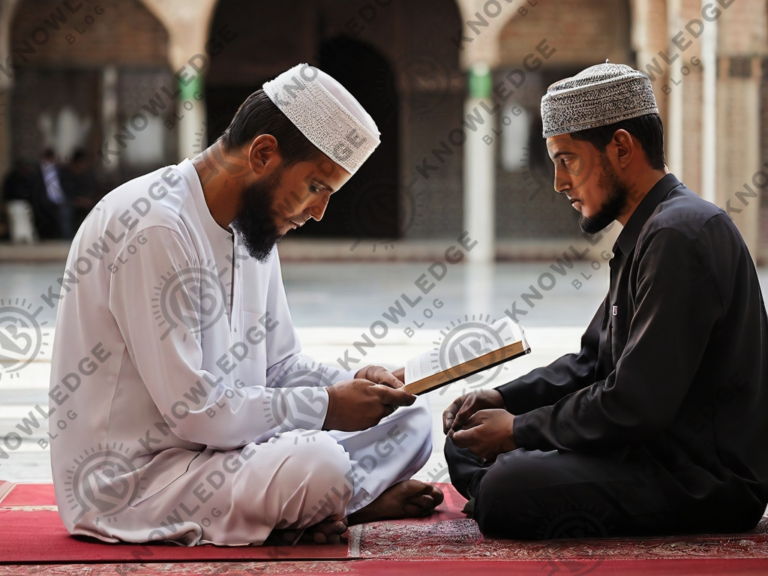What Is the Religion of Islam Based On

Today we can see number of people interesting in Islam has increased a lot. Many people are looking to know what is the religion of Islam based on.
Today we are going to answer about What is the religion of Islam based on.
Introduction to Islam
Islam, one of the world’s major monotheistic religions, has a rich history, profound teachings, and a profound impact on millions across the globe.
It originates from the Arabic word ‘Salam,’ meaning peace and submission. Thus, Islam fundamentally calls for peace through submission to the will of Allah (God), the creator and sustainer of the universe. The followers of Islam, known as Muslims, base their way of life on the Quran, which is the literal word of God as revealed to the Prophet Muhammad over 1,400 years ago in Mecca, Saudi Arabia.
Muhammad is the last prophet in a long line of prophets sent by God to guide humanity, which includes figures such as Adam, Noah, Abraham, Moses, and Jesus, all respected in Islam. His life and teachings, along with the Quran, form the bedrock of Islamic faith and practice.
What Is the Religion of Islam Based On
Monotheism
Monotheism in Islam is the belief in the oneness of God (Allah). This principle, known as Tawhid, asserts that Allah is singular, unique, and incomparable. He is the creator of everything, sustains the universe, and is the only one deserving of worship. This fundamental belief differentiates Islam from polytheistic religions and emphasizes a personal, direct relationship between Muslims and Allah, without intermediaries.
Pillars of Islam
The Pillars of Islam serve as the foundation for a Muslim’s faith and practices, outlining the essential rituals and acts of worship.
- Shahada (Declaration of Faith): The Shahada is the declaration of faith in Islam “There is no god but Allah, and Muhammad is the messenger of Allah.”
- Salah (Prayer): Muslims perform five daily prayers facing Mecca. These prayers are a direct communication with Allah.
- Zakat (Almsgiving): This is a mandatory charitable contribution, usually a fixed percentage of a Muslim’s savings.
- Sawm (Fasting during Ramadan): During Ramadan, Muslims engage in fasting from sunrise to sunset.
- Hajj (Pilgrimage to Mecca): This pilgrimage is obligatory for all Muslims who are physically and financially able to undertake it.
Related Article: What You Need to Learn About Islam
Pillars of Faith
The Pillars of Faith outline the key beliefs in Islam, supporting a Muslim’s spiritual framework.
- Belief in Allah: Recognizing Allah’s oneness, omnipotence, and role as the only deity.
- Belief in Angels: Acknowledging the existence of angels, created by Allah from light.
- Belief in the Revealed Books: Accepting the Quran as the final revelation from Allah, along with earlier scriptures given to previous prophets.
- Belief in the Prophets: Believing in the prophets sent by Allah, including Adam, Noah, with Muhammad as the last prophet.
- Belief in the Day of Judgment: Faith in a final assessment by Allah, where individuals will be judged on their actions.
- Belief in Predestination: Accepting that Allah preordains all good and bad fate.
Heaven and Hell
Islam teaches the existence of an afterlife, where individuals are rewarded with paradise (Heaven) for their faith and good deeds, or punished in Hell for their sins.
The belief in the afterlife serves as a significant motivator for Muslims to lead righteous lives, adhering to the teachings of Islam.
Brotherhood in Islam
The concept of brotherhood in Islam emphasizes the idea of a single, global Muslim community, or Ummah, united in faith and practice.
This principle promotes equality, support, and compassion among Muslims, regardless of ethnic, national, or racial differences, fostering a sense of unity and shared purpose.

Sources of Islamic Law and Guidance
Islamic law, known as Sharia, provides a comprehensive framework that guides the spiritual, social, and personal aspects of a Muslim’s life.
The Quran and the Sunnah are the fundamental sources of Islamic law and guidance.
The Quran
Quran is the foremost source of Islamic law and guidance, it is the literal word of God (Allah) revealed to the Prophet Muhammad. It serves as a divine manual for life, encompassing teachings on faith, morality, law, and governance.
The Quran’s significance in Islamic law cannot be overstated. It is the ultimate authority in matters of worship, personal conduct, the family, criminal law, and societal obligations.
- Divine Revelation: The Quran is the direct revelation from Allah, making it the most sacred and authoritative.
- Comprehensive Guidance: It covers a wide range of topics, including religious practices, social justice, marriage, inheritance, and financial transactions.
- Immutable and Eternal: as the final revelation from Allah, the Quran is immutable, remains relevant for all times, and places.
The Sunnah
Sunnah, the second primary source of Islamic law, consists of the teachings, sayings, and actions of the Prophet Muhammad.
The Sunnah complements the Quran by offering a practical demonstration of how to apply its teachings in everyday life.
- Practical Application: The Sunnah offers practical examples of how to apply Quranic principles. For instance, while the Quran instructs Muslims to perform the Salah (prayer). the Sunnah details the method of prayer, including the number of units (rak’ahs) and the specific recitations.
- Clarification and Specification: In instances where the Quran provides general guidelines, the Sunnah clarifies and specifies the manner in which these guidelines should be followed.
- Legislative Authority: The Sunnah holds legislative authority and is used alongside the Quran to derive Islamic law and jurisprudence.
Together, the Quran and the Sunnah form the foundation of Islamic belief, law, and practice. They guide Muslims in all aspects of life.
Other Religions In Islam
In Islam, the presence and acknowledgment of other religions are rooted in its scriptures and teachings.
Here’s how Islam views other religions:
People of the Book (Ahl al-Kitab)
Islam specifically mentions Jews and Christians, referring to them as “People of the Book.” This term acknowledges their reception of earlier revelations from God in the form of the Torah and the Gospel, respectively.
Shared Prophets
Islam recognizes a succession of prophets shared with Judaism and Christianity, affirming Islam’s belief in a single, unifying monotheistic tradition.
Muslims regard Muhammad as the final prophet, who came to restore the pure monotheism taught by his predecessors. While Islam holds deep respect for these figures, it also asserts differences in their narrative and teachings, especially regarding Jesus.
Islam honors Jesus as a prophet but rejects the Christian doctrines of the Trinity and the divine sonship of Christs.
Respect and Tolerance
The Quran and the Hadith (sayings and actions of Prophet Muhammad) emphasize respect and tolerance towards followers of other religions, particularly the People of the Book.
The Finality of Islam
While Islam acknowledges the legitimacy of earlier monotheistic religions, it views itself as the final and complete revelation of God’s will to humanity. The Quran is seen as the last divine scripture, and Muhammad as the seal of the prophets.
Related Article: What Is Islamic Way of Meditation?
Conclusion
The religion of Islam is fundamentally based on the unwavering belief in the oneness of God. The teachings of the Quran and the Sunnah further enrich this framework, offering detailed guidance on living a life.
We hope that we are able to answer about What is the religion of Islam based on, in clear and simple way.






